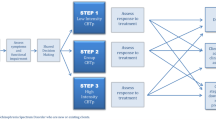Abstract
Emerging models of cognitive-behavioral treatment (CBT) offer promising new intervention strategies in the psychotherapy of schizophrenia. These models, however, have not been integrated into community support programs and evaluated in comparison to standard community treatments. This study examined differences in outcomes of clients who received long-term day treatment program services (DTP) compared to clients who received individual CBT that was included as part of their DTP treatment. Twenty-four clients were randomly assigned to DTP treatment or CBT/DTP treatment. Data on standardized measures of psychosocial functioning, symptomatology and rehospitalizations were collected over the course of three years of treatment. Analysis of variance with repeated measures was conducted to evaluate the effects of type of treatment (CBT/DTP and DTP) and time (dependent variable scores taken at the end of treatment years one, two and three) on the three outcome variables. Results indicate significant improvement for the CBT/DTP group compared to the DTP group in the patterns of change over time for psychosocial functioning and symptomology. In addition to this significant group/time interaction the time factor was also significant for both variables. For rehospitalizations the time factor was significant and the group/time factor was nonsignificant. Implications for service delivery to persons with schizophrenia and suggestions for future research are discussed.
Similar content being viewed by others
REFERENCES
A Recovery Patient (1986). Can we talk: The schizophrenic patient in psychotherapy. American Journal of Psychiatry, 86, 1468-70.
Alford, B. & Correia, C. (1994). Cognitive therapy of schizophrenia: Theory and empirical status. Behavior Therapy, 25, 17-33.
Anthony, W. (1980). Principles of Psychiatric Rehabilitation. Baltimore: University Park Press.
Beck, A. (1984). Cognitive approaches to stress. In R. Woolfolk & P. Lehren Eds.), Principles and Practice of Stress Management (pp. 125-155). New York: Guilford.
Bradshaw, W. (1998). Cognitive-behavioral treatment of schizophrenia: A case study. International Journal of Cognitive Psychotherapy, 12, 1, 13-26.
Bradshaw, W. (1997). Evaluating cognitive-behavioral treatment of schizophrenia: Four singlecase studies. Research on Social Work Practice, 7, 419-445.
Brekke, J., Long, J., Nesbit, N. & Sobel, E. (1997). The impact of service characteristics on functional outcomes from community support programs for persons with schizophrenia: A growth curve analysis. Journal of Consulting and Clinical Psychology, 65, 464-475.
Chadwick, P. & Lowe, C. (1990). Measurement and modification of delusional beliefs. Journal of Consulting and Clinical Psychology, 58, 225-232.
Chadwick, P. & Lowe, C. (1994). A cognitive approach to measuring and modifying delusions. Behavior Research and Therapy, 32, 355-367.
Davidson, L. & Strauss, J. (1992). Sense of self in recovery from severe mental illness. British Journal of Medical Psychology, 65, 131-145.
Derogatis, L. (1974). The Hopkins symptom inventory. Behavioral Science, 9, 1-15.
Drury, V., Birchwood, M., Cochrane, R. & MacMillan, F. (1996a). Cognitive therapy and recovery from acute psychosis: A controlled trial I. Impact on psychotic symptoms. British Journal of Psychiatry, 169, 593-601.
Drury, V., Birchwood, M., Cochrane, R. & MacMillan, F. (1996b). Cognitive therapy and recovery from acute psychosis: A controlled trial II. Impact on recovery time. British Journal of Psychiatry, 169, 602-607.
Ellis, A. (1970). The Essence of Rational Emotive Psychotherapy: A Comprehensive Approach to Treatment. New York: Institute for Rational Living.
Fenton, W. & McGlashen, T. (1997). We can talk: Individual psychotherapy for schizophrenia. American Journal of Psychiatry, 154, 1493-1494.
Frank, A. & Gunderson, J. (1990). The role of the therapeutic alliance in the treatment of schizophrenia: Relationship to course and outcome. Archives of General Psychiatry, 47, 228-236.
Garety, P., Fowler, D., Kuipers, E., Freeman, D., Dunn, G., Bebbington, P., Hadley, C. & Jones, S. (1997). London-East Anglia randomised controlled trial of cognitive-behavioral therapy for psychosis: II. Predictors of outcome. British Journal of Psychiatry, 171, 420-426.
Goodman, S., Sewell, D., Cooley, E. & Leavitt, N. (1993). Assessing levels of adaptive functioning: The role funtioning scale. Community Mental Health Journal, 29, 119-131.
Kingdom, D. & Turkington, D. (1991). The use of cognitive behavior therapy with a normalizing rationale in schizophrenia. Journal of Nervous and Mental Disease, 179, 207-211.
Kingdom, D. & Turkington, D. (1994). Cognitive Therapy of Schizophrenia. New York: Guilford Press.
Kuipers, E., Garety, P., Fowler, D., Dunn, G., Bebbington, P., Freeman, D. & Hadley, C. (1997a). London-East Anglia randomised controlled trial of cognitive-behavioral therapy for psychosis: I. Effects of the treatment phase. British Journal of Psychiatry, 319-327.
Kuipers, E., Garety, P., Fowler, Chisholm, D., Freeman, D., Dunn, G., Bebbington, P. & Hadley, C. (1997b). London-East Anglia randomised controlled trial of cognitive-behavioral therapy for psychosis: III. Follow-up and economic evaluation at 18 months. British Journal of Psychiatry, 173, 61-68.
Lowe, C. & Chadwick, P. (1990). Verbal control of delusions. Behavior Therapy, 21, 461-479.
Perris, C. (1992). Integrating strategies in the treatment of young severely disturbed patients. Journal of Cognitive Psychotherapy, 6, 205-213.
Tarrier, N., Beckett, R., Harwood, S., Baker, B., Yusopoff, L. & Ugarteburu, I. (1993). A trial of two cognitive-behavioural methods of treating drug-resistant residual psychotic symptoms in schizophrenic patients: I. Outcome. British Journal of Psychiatry, 162, 524-532.
Tarrier, N., Sharpe, L., Beckett, R., Harvood, S. & Yusopoff, L. (1993). A trial of two cognitive behavioural methods of treating drug-resistant residual psychotic symptoms in schizophrenic patients: II. Treatment specific changes in coping and problem-solving skills. Social Psychiatry and Psychiatric Epidemiology, 28, 5-10.
Wallace C., Liberman, R. MacKain, S., Eckman, T. & Blackwell. (1992). Effectiveness and replicability of modules for teaching social and instrumental skills to severely mentally ill. American Journal of Psychiatry, 149, 654-658.
Wasylenski, D. (1992). Psychotherapy of Schizophrenia Revisited. Hospital & Community Psychiatry, 43, 123-127.
Wolpe, J. (1973). The Practice of Behavior Therapy. New York: Jason Aronson.
Author information
Authors and Affiliations
Rights and permissions
About this article
Cite this article
Bradshaw, W. Integrating Cognitive-Behavioral Psychotherapy for Persons with Schizophrenia into a Psychiatric Rehabilitation Program: Results of a Three Year Trial. Community Ment Health J 36, 491–500 (2000). https://doi.org/10.1023/A:1001911730268
Issue Date:
DOI: https://doi.org/10.1023/A:1001911730268




